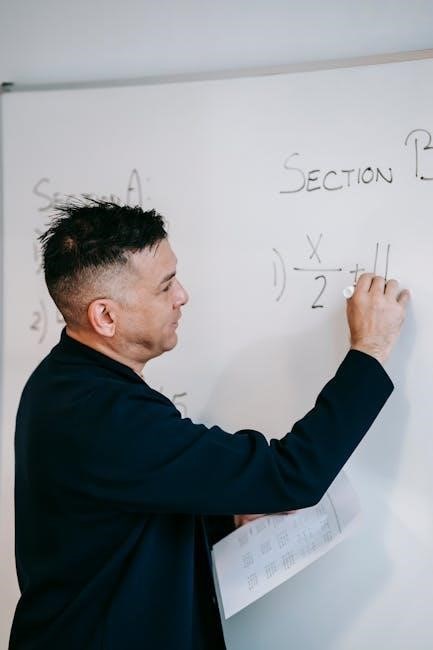The Maryland State Education Association (MSEA) is the largest teachers union in Maryland, advocating for educators and public schools. With new leadership, it empowers members to shape education policies and support candidates through the Apple Ballot voter guide.
1.1 Understanding the Role of the Maryland State Education Association (MSEA)
The Maryland State Education Association (MSEA) is a powerful advocate for educators and public schools, representing over 75,000 members statewide. As the largest union in Maryland, MSEA focuses on improving teacher salaries, benefits, and working conditions while promoting equitable education policies. Founded in 1865, the organization is committed to ensuring all students receive a world-class education. MSEA’s influence extends beyond classrooms, shaping legislative agendas and endorsing candidates through its Apple Ballot voter guide. By empowering educators, MSEA plays a pivotal role in fostering a supportive environment for both students and staff across Maryland.
1.2 Importance of the Voting Guide for Educators and Voters
The Maryland Teachers Union Voting Guide, known as the Apple Ballot, is a trusted resource empowering educators and voters to make informed decisions. By highlighting endorsed candidates and key issues, it ensures educators’ voices are heard in policies affecting schools. This guide simplifies complex political choices, enabling voters to support leaders aligned with education priorities. Its influence extends beyond educators, helping the broader community understand candidates’ stances on public education. Ultimately, the voting guide strengthens civic engagement and advocacy for quality schools, benefiting both educators and students statewide.

MSEA Endorsement Process and Its Impact
MSEA’s endorsement process involves rigorous candidate evaluations, with the Apple Ballot serving as a trusted guide. This process significantly influences election outcomes, empowering educators and voters statewide.
2.1 How Candidates Are Endorsed by MSEA

Candidates seeking MSEA endorsement undergo a rigorous evaluation process. They complete detailed questionnaires, participate in interviews with local affiliates, and present their education-focused platforms. The MSEA Representative Assembly votes on endorsements, requiring a minimum of 58% approval. This democratic process ensures alignment with MSEA’s priorities, such as teacher salaries, education reform, and student equity. Endorsed candidates receive the “Apple Ballot” designation, which is highly influential among educators and voters, enhancing their visibility and credibility in elections.
2.2 The Apple Ballot: MSEA’s Voter Guide
The Apple Ballot is MSEA’s official voter guide, distributed to members and voters statewide. It highlights endorsed candidates for state and local races, providing educators with a trusted resource to make informed decisions. The guide reflects MSEA’s commitment to advancing public education and supporting candidates who prioritize teacher salaries, student equity, and education reform.

Candidates earning the Apple Ballot endorsement are vetted through MSEA’s rigorous process, ensuring alignment with the union’s values. This influential guide not only shapes election outcomes but also amplifies educators’ voices in shaping Maryland’s education landscape.
Key Issues and Policies Advocated by MSEA
MSEA advocates for competitive teacher salaries, education reform, and equitable resources for all schools. Key policies include reducing standardized testing and increasing diversity training.
3.1 Teacher Salaries and Benefits
MSEA prioritizes improving teacher salaries and benefits to attract and retain top educators. The union aims to raise starting salaries to $60,000 by 2026 and enhance healthcare and retirement benefits. By addressing these issues, MSEA seeks to elevate the profession and ensure educators can focus on providing high-quality instruction. Fair compensation and robust benefits are seen as critical to maintaining a motivated and effective teaching workforce, ultimately benefiting students and communities across Maryland.

3.2 Education Policy and Reform
MSEA advocates for education policies that prioritize student success and equity. Key initiatives include reducing standardized testing, increasing diversity and equity training, and ensuring charter schools are under local school board control. The union supports reforms that address resource disparities, promote modern learning environments, and provide educators with the tools they need. By championing these policies, MSEA aims to create a more inclusive and effective education system for all Maryland students, ensuring they receive a world-class education regardless of their background or zip code.

MSEA Leadership and Elections
MSEA’s leadership transition includes Paul Lemle as president and Nikki Woodward as vice president, replacing Cheryl Bost. The union is shifting to a 12-member board, with elections held annually by members to vote on officers and set the organization’s direction.
4.1 New Leadership: Paul Lemle and Nikki Woodward
Paul Lemle and Nikki Woodward assumed leadership roles in MSEA, replacing Cheryl Bost and Theresa Mitchell Dudley. Their election marked a significant shift, with Lemle defeating Dudley in a statewide vote. As president, Lemle brings a focus on teacher salaries, education policy, and resources for schools. Woodward, as vice president, emphasizes collaboration and member empowerment. Together, they aim to strengthen MSEA’s advocacy for educators and public education, ensuring Maryland’s schools receive the support needed for student success. Their leadership underscores MSEA’s commitment to equitable education and teacher well-being.
4.2 Transition to a 12-Member Board of Directors
MSEA is transitioning to a 12-member Board of Directors, as directed by the 2022 Representative Assembly. This change aims to enhance representation and governance. The board expansion is phased, with recent elections focusing on regions 1 and 5, following earlier elections in regions 4 and 6. This restructuring ensures diverse voices and equitable representation across Maryland. The transition reflects MSEA’s commitment to modernizing its structure to better serve members and advocate for education priorities. This shift is expected to improve decision-making and align the union’s leadership with the needs of its growing membership.
Voting Mechanics and Member Participation
MSEA members vote annually at statewide meetings, electing officers and setting policy. Local affiliates ensure representation, while the Apple Ballot guides endorsements, empowering educators’ voices in elections.
5.1 How MSEA Members Vote on Policies and Officers
MSEA members vote annually at statewide meetings, typically attended by elected delegates from local affiliates. These delegates represent their regions and cast ballots on behalf of their members. Voting is conducted via secret ballot, ensuring confidentiality and fairness. Members directly elect officers, including the president and vice president, while policy decisions are made by majority vote. This democratic process ensures that the union’s direction aligns with the collective voice of its educators. The meetings also provide a platform for discussing key issues and setting priorities for the upcoming year.
5.2 The Role of Local Affiliates in the Voting Process
Local affiliates play a crucial role in MSEA’s voting process by electing delegates who represent their regions at the statewide meeting. These delegates are responsible for voting on policies and officer elections. Affiliates also engage members through discussions and endorsements, ensuring diverse perspectives are considered. They distribute the Apple Ballot voter guide, which highlights endorsed candidates and issues. By organizing local meetings and providing education on key topics, affiliates empower members to make informed decisions. This grassroots approach strengthens the union’s democratic structure and ensures that local voices significantly influence statewide decisions.

Influence of MSEA on Maryland Elections
MSEA significantly impacts Maryland elections through endorsements and voter engagement, leveraging its Apple Ballot guide to influence outcomes and encourage high voter turnout among educators and supporters.
6.1 Endorsements in Congressional and State Races
MSEA plays a pivotal role in shaping Maryland elections through strategic endorsements. By backing candidates who align with its educational priorities, MSEA influences both congressional and state-level races. The union’s endorsements are featured in the Apple Ballot, a voter guide distributed to members, ensuring candidates who support public education receive visibility. For instance, in 2024, MSEA endorsed Sarah Elfreth, Johnny Olszewski, and Joe Vogel for congressional seats, highlighting their commitment to education reform and teacher support. These endorsements often sway voter sentiment, particularly among educators, amplifying MSEA’s impact on election outcomes and policy direction.
6.2 Voter Turnout and Civic Engagement Among Members
MSEA prioritizes civic engagement, encouraging members to participate in elections. With a strong track record of high voter turnout among educators, the union leverages its Apple Ballot guide to inform and mobilize members. Workshops, seminars, and digital campaigns are used to educate educators on key issues and candidates. MSEA’s efforts ensure members’ voices are heard, promoting policies that benefit public education. This active participation underscores the union’s influence in shaping Maryland’s political landscape and advancing educational priorities through collective action. By fostering civic duty, MSEA empowers educators to advocate for their profession and students’ futures. Their engagement often exceeds state averages, demonstrating their commitment to democracy.
